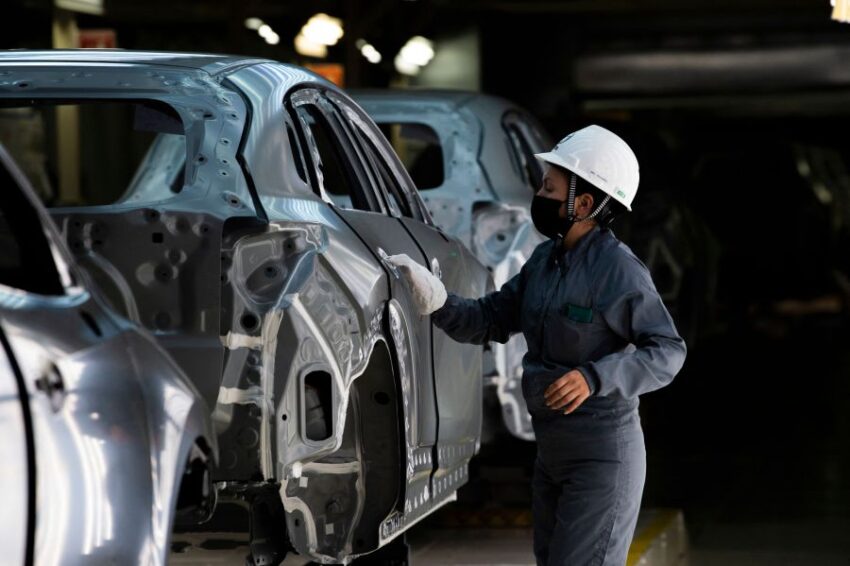EL PASO, Texas (Border Report) – Commerce Secretary Howard Lutnick confirmed on Sunday that President Trump intends to renegotiate the U.S.-Mexico-Canada Agreement.
Trump “wants to protect American jobs. He doesn’t want cars built in Canda or Mexico when they could be built in Michigan and Ohio. It’s just better for American workers,” Lutnick said on CBS’ Face the Nation.
The USMCA is set for review by the three countries before next July 1. It is set to expire in 2036 unless the three parties renew it for another 16-year-term.
The announcement sent jitters among some on the border whose livelihood and investments for the past 30 years have hinged on free trade with Mexico and Canada.
Around 150 factories in Juarez, Mexico, for instance, manufacture parts and electric components for autos in the United States. Trump administration tariffs on automotive components not covered by USMCA reportedly already are shutting down some production lines in Mexico.

Forcing production back to the states will mean higher prices for consumers in the U.S. and job displacement in Mexico, said Marcelo Vasquez, regional director of the Mexican National Association of Importers and Exporters.
“Some production is already off-line. In Guanajato, they assembled a line for Toyota and took it to Indiana. All of this will start having an impact. People are being left without jobs on the border, so some are going elsewhere in Mexico […] Nuevo Leon, Central Mexico where there are jobs,” Vasquez told Border Report.
Vasquez worries other products will be affected by a renegotiation of the treaty, judging by recent tariffs on Mexican tomatoes. USMCA eliminated many agricultural tariffs, but tomatoes have been targeted on and off by the U.S. government amid concerns about the product being sent to America at unfair low prices thus harming U.S. growers.
“We see changes (to USMCA) in favor of the United States, not a trilateral negotiation. He will seek to strengthen all of his interests; he will make it difficult for some products to come in and leave tariffs on other products, like tomatoes,” he said.
On the U.S. side of the border, industry leaders worry that Trump will try to include his signature fight against fentanyl and illegal immigration in the new trade treaty.
“I think those two factors, immigration and drugs, will come into play when the USMCA is reviewed,” said Jerry Pacheco, president and CEO of the Border Industrial Association. “I personally don’t feel those two factors have any place in a trade agreement. They should be dealt separately. I don’t see why the trade community should be held hostage to two issues that it really does not control.”
On the other hand, a renegotiation means an opportunity for the North American partners to enact a common trade policy when dealing with other countries or trade blocs.
“One thing needs to be discussed is the heartburn the United States has with Chinese companies that come in through the backdoor, protected by the USMCA when they come through, let’s say, Mexico,” Pacheco said. “The U.S., Mexico and Canada could come to an agreement to let Chinese companies come into Mexico but not receive the same benefits as North American companies.
“It would allow us to better police those trying to come in without any loyalty to the North American trade bloc.”
As is the case in Juarez, the uncertainty brought by Trump administration tariffs and now talk about renegotiating free trade is costing the El Paso-Southern New Mexico region investment opportunities.
“Industries here are stuck in ‘neutral’ in terms of making strategic decisions. I had a couple of companies (in New Mexico) cancel their expansion plans. I had one company that was coming postpone their plans because the 50 percent tariff on aluminum and steel would add about $75,000 per unit,” Pacheco said.
A few companies are still coming amid the uncertainty, he said, like a German company that makes aircraft and elevator parts in addition to auto components. They’re moving into one of the industrial parks in Santa Teresa, New Mexico.

Back in Juarez, another business leader agrees this is not the best of times for border industry but wonders why the Mexican government is not stepping in more decisively.
“There are no new industrial parks, no new large investments. We’ve had some stability since June, but we don’t see the maquila industry growing,” said Thor Salayandia, president of the Border Entrepreneurial Bloc, or BEF.
He said 500 small businesses have closed in the city and nearly 60,000 employees laid off in the past two years as labor costs went up and new investment slowed.
Further obstacles to cross-border trade will force border industries to increasingly automate production, move to southern Mexico or Central America, close or become suppliers to the surviving manufacturing operations.
 Read: Read More
Read: Read More




